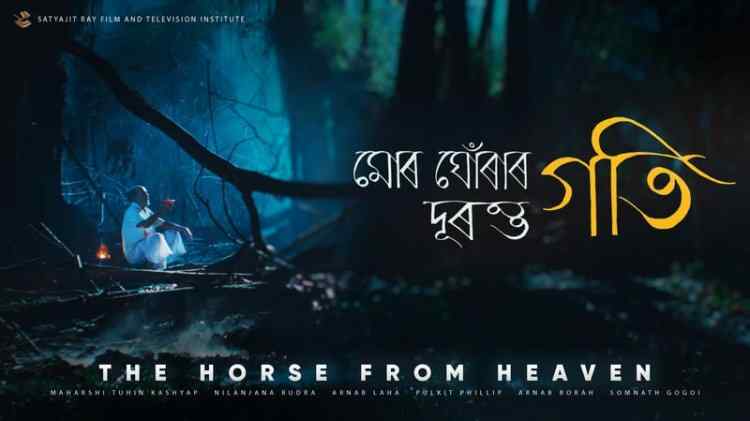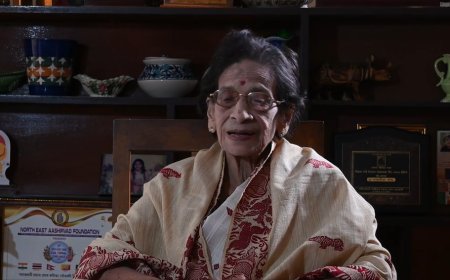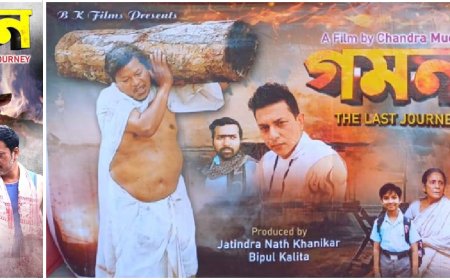Maharshi Kashyap’s Oscar Qualifying Assamese Short Film is a Subtle Ode to a Truth that is Stranger than Fiction
Assam filmmaker Maharshi Tuhin Kashyap brought good news for Assam when his Assamese short film Mur Ghurar Duronto Goti qualified for competing for the Academy Awards or Oscars after winning the top award at the Bengaluru International Short Film Festival 2022.

Assam filmmaker Maharshi Tuhin Kashyap brought good news for Assam when his Assamese short film Mur Ghurar Duronto Goti qualified for competing for the Academy Awards or Oscars after winning the top award at the Bengaluru International Short Film Festival 2022.
Mur Ghurar Duronto Goti or The Horse from Heaven opens in retrospection of Kuxhol (Atul Pachani), an Ojapali performer, sat on his donkey’s back, or a horse as he might as he journeys into the night. The name is Goti. Goti means speed and his horse as he claims to be - is the fastest horse in the world. Goti's only destination is to reach Abdullah and run in the race but there are several stoppages along the way.
“Once the fog had cleared, Goti and I reached our destiny,” Kuxhol says before traversing back through his most cherished moments of how he came across the donkey and named it a horse. However, we are not his only audience. He is narrating this profound tale of his destiny to a bunch of equally interested men in a salon who are dearly eager to hear more from him about this horse from heaven. And hence he continues to share about the fortunes and misfortunes of the pair.
The donkey and Kuxhol share a cosmic relationship. As a sign of companionship to Kuxhol, who is engulfed by the majesty and mysticism of the horse, the donkey (read horse), on the other hand, responds to the clinking sound of Kuxhol’s Taal (a traditional musical instrument). In essence, Kuxhol's story is one of loneliness, where he finds both solace and company in Goti.
Writer-director Maharshi Tuhin Kashyap honors the strangeness and absurdity of the plot by bringing in a natural yet surreal touch to it. The backdrop is always the natural (or sometimes the man-made) environment that we inhibit, whether it be a foggy jungle at night or a mildly lighted street. However, he creates a rather bizarre atmosphere surrounding these fields, streets, and cities which helps in his effort to translate the magic realism of his narrative into visually striking images. It’s very elaborate visuals enhances its wide shots and the non linear sequences contribute to its witty and playful mood.
The decision to employ Ojapali (an indigenous folk dance of Assam) music in the background throughout the film also lends in an air of spookiness that enhances the story's flow. Giving the familiar or perhaps the devout traditional sounds of Assam (the sound of Bor Taal and Khul for example) an unsettling shape is something that director Bhaskar Hazarika has successfully tried before for the background score of his National Award-winning film Kothanodi. This works here in The Horse from Heaven’s favor too. In this way, the visuals and the sound enables us to deeply engage with the unearthly events and comprehend the character's psychology as well.
Considering the mystery surrounding him, Kuxhol is an eccentric middle-aged man who bemoans how people react to him. A ‘fool’ or ‘pain in the asses’ is what he says people reduced him to. But now he thinks that his most amiable companionship is something to be envied and the horse will help him find newer and better opportunities. And this is where the story takes its biggest leap and this is also where the film is at its most honest.
The short film examines the tenuous border between truth and fiction, reality and fantasy. Truth is subjective. Truth is a representation. Truth is a belief. We are the truth we choose to believe in. We are the truth we decide to accept as true. Since Kuxhol believes his donkey to be a horse, the others with whom he recounts his tale are obligated to believe as well. His truth might be larger than life but it certainly lends him a conviction – to convince himself or others. For him, his truth is an escape – possibly from the insensitive circumstances that he had previously encountered. And in this regard, the donkey becomes a symbol for everything that we hope to pull out from our miserable lives. The donkey may even be hope itself, if we are willing to believe it. The donkey even speaks of our dreams – foolish if we tend to see it only as a donkey but mighty if we can see it as a gifted beauty. Without dreams, a group of final-year students of the Satyajit Ray Film & Television Institute, Kolkata, would not have been able to make it to the Oscars. Even the director, Maharshi Kashyap has himself acknowledged his age old dream to make it to the Oscars.
Meanwhile, the perceivability of a city of donkeys can only go far enough. When Abdullah refuses his horse, Kuxhol is discouraged, yet he never for once doubts the veracity of his own claims. He believes that the true mind can always discern the reality of Goti. If one is determined enough, they can confront the most inaccessible - Godot. As Kuxhol does at the film's conclusion - encounter Godot himself! But in a setting that not only includes barren land and a snag but also water – substance of life.
The silly and absurdist humor of Kashyap’s film places Snehankar Chakraborty as Godot at the centre of the film’s climax. Godot was engrossed in Kuxhol's account of his endowed beauty – the heavenly horse – when he was supposed to be arriving for Vladimir and Estragon! As the phrase ‘Waiting for Godot’ refers to a scenario where one holds expectations for something which is highly unlikely, here, Kuxhol's surprise encounter with Godot disproves it. And once the fog had cleared, Goti and Kuxhol reached their destiny. For the truth shall continue to be stranger than fiction.
The movie has aspects of black humour, but it also has a sincere and a tragic truth, which is how it contextualizes the Goti and Godot of our everyday lives. Veteran actor Atul Pachani delivers a funny, and endearing performance as Kuxhol which almost sets off a redemptive arc within us. From the essence of truth, identity, and individuality to a cultural reading where Goti can also be interpreted as Kuxhol’s livelihood – which is in sharp decline and lagging behind the quick pace of city life despite it still having a cultural following – the short film has many themes packed into what appears to be seemingly straightforward tale of a man and a horse. The Horse from Heaven is not only funny, imaginative and abstract but also insightful and powerful.
What's Your Reaction?

































































